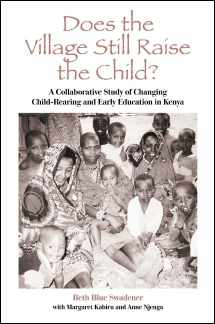
Does the Village Still Raise the Child?: A Collaborative Study of Changing Child-Rearing and Early Education in Kenya (Suny Series, Early Childhood Education)
ISBN-13:
9780791447581
ISBN-10:
0791447588
Edition:
Illustrated
Author:
Beth Blue Swadener, Margaret Kabiru, Anne Njenga
Publication date:
2000
Publisher:
State Univ of New York Pr
Format:
Paperback
322 pages
FREE US shipping
Book details
ISBN-13:
9780791447581
ISBN-10:
0791447588
Edition:
Illustrated
Author:
Beth Blue Swadener, Margaret Kabiru, Anne Njenga
Publication date:
2000
Publisher:
State Univ of New York Pr
Format:
Paperback
322 pages
Summary
Does the Village Still Raise the Child?: A Collaborative Study of Changing Child-Rearing and Early Education in Kenya (Suny Series, Early Childhood Education) (ISBN-13: 9780791447581 and ISBN-10: 0791447588), written by authors
Beth Blue Swadener, Margaret Kabiru, Anne Njenga, was published by State Univ of New York Pr in 2000.
With an overall rating of 3.9 stars, it's a notable title among other
books. You can easily purchase or rent Does the Village Still Raise the Child?: A Collaborative Study of Changing Child-Rearing and Early Education in Kenya (Suny Series, Early Childhood Education) (Paperback) from BooksRun,
along with many other new and used
books
and textbooks.
Description
Considers the impacts of rapid social, economic, and cultural change on child-rearing and early education in Kenya.
Examining the degree to which Kenyan children are still communally raised, this book presents findings from a national collaborative study considering the impacts of rapid social, economic, and cultural change on child-rearing and early education in Kenya. The narratives of over 460 parents, grandparents, preschool teachers, children, and community leaders provide unique insights on the impacts of neo-colonial policies, “development” practices, and national austerity measures on everyday lives of families.
A unique aspect of this book is that it “decolonizes” research through sustained collaboration on all aspects of the study, from design and interview protocol development, to data collection and analysis, through dissemination. This book becomes, then, an invaluable model, for how to do thoughtful, collaborative, comparative research.
Examining the degree to which Kenyan children are still communally raised, this book presents findings from a national collaborative study considering the impacts of rapid social, economic, and cultural change on child-rearing and early education in Kenya. The narratives of over 460 parents, grandparents, preschool teachers, children, and community leaders provide unique insights on the impacts of neo-colonial policies, “development” practices, and national austerity measures on everyday lives of families.
A unique aspect of this book is that it “decolonizes” research through sustained collaboration on all aspects of the study, from design and interview protocol development, to data collection and analysis, through dissemination. This book becomes, then, an invaluable model, for how to do thoughtful, collaborative, comparative research.


We would LOVE it if you could help us and other readers by reviewing the book
Book review

Congratulations! We have received your book review.
{user}
{createdAt}
by {truncated_author}


